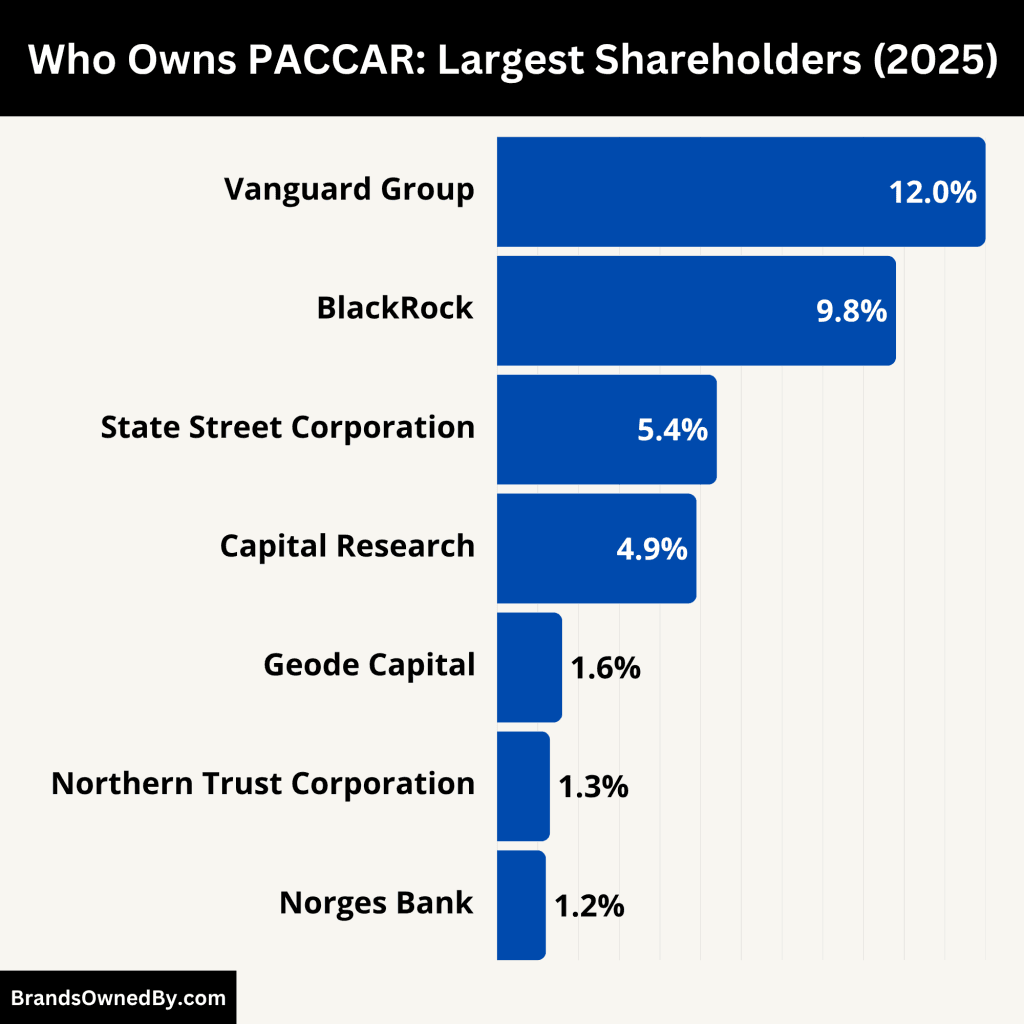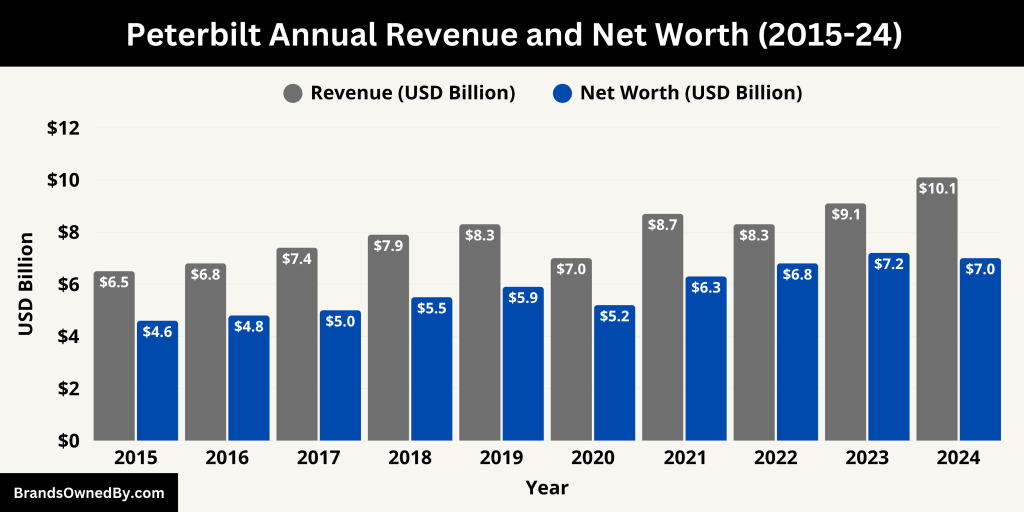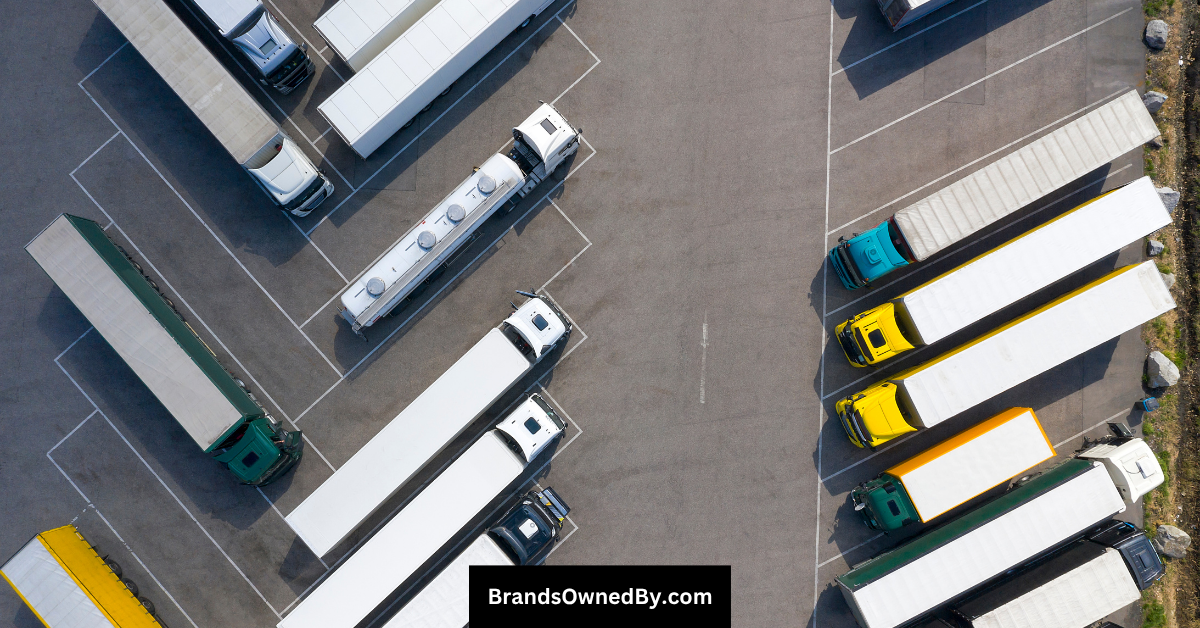Peterbilt is one of the most iconic names in American trucking. Known for its premium heavy-duty trucks, many people ask, who owns Peterbilt? The answer is tied to a much larger and influential vehicle manufacturer in the global market.
Peterbilt Company Profile
Peterbilt Motors Company is a leading American manufacturer of medium- and heavy-duty trucks. The brand is best known for producing Class 5 through Class 8 commercial vehicles. Peterbilt trucks are particularly popular among long-haul truckers due to their durability, comfort, and iconic design.
Founding and Origins
Peterbilt was founded in 1939 by T.A. Peterman, a businessman and lumber entrepreneur from Tacoma, Washington. Peterman needed reliable logging trucks for his lumber operations, but he was dissatisfied with the options available. He acquired the assets of Fageol Motors, a defunct truck company, and used them to build his own specialized trucks.
The first Peterbilt truck, the Model 260, was built in 1939. These early models were designed specifically for logging and heavy-duty applications. The company quickly earned a reputation for quality and ruggedness.
Early Growth and Expansion
In the 1940s and 1950s, Peterbilt expanded production and began building trucks for broader industrial uses. Its reputation grew across the West Coast and gradually expanded eastward.
In 1958, Peterbilt was acquired by PACCAR Inc., then known as Pacific Car and Foundry Company. This acquisition marked a turning point. Under PACCAR, Peterbilt gained access to more capital, technology, and distribution networks. The brand maintained its identity and engineering independence but benefited from the scale and efficiency of its new parent.
Major Milestones
- 1939: Peterbilt is officially founded by T.A. Peterman in Oakland, California.
- 1940s: Introduction of the first heavy-duty commercial trucks, focusing on the logging industry.
- 1958: Acquired by PACCAR Inc., providing growth capital and resources for national expansion.
- 1960s–1970s: Peterbilt becomes a national brand and opens its flagship manufacturing plant in Newark, California.
- 1980: Opened the Denton, Texas plant, now the company’s primary manufacturing facility.
- 1993: Introduced the Model 379, one of the most iconic long-nose trucks, widely loved by American truckers.
- 2000s: Invested in aerodynamic truck designs and advanced driver systems.
- 2010s–2020s: Rolled out electric truck models like the Model 579EV, introduced digital dashboards, and expanded into telematics and data analytics.
Today, Peterbilt is a symbol of American trucking heritage. It is favored for long-haul and vocational applications, offering durability, resale value, and customization options. Despite being owned by PACCAR, Peterbilt maintains its unique brand image and loyal customer base.
Who Owns Peterbilt in 2025
Peterbilt Motors Company is wholly owned by PACCAR Inc., a major American manufacturer of commercial vehicles. PACCAR is the sole parent company and oversees all aspects of Peterbilt’s operations. From truck design to sales and service networks, Peterbilt functions as an integral part of PACCAR’s global truck portfolio.
Parent Company: PACCAR Inc.

PACCAR Inc. is a Fortune 500 company headquartered in Bellevue, Washington. It is one of the largest producers of medium- and heavy-duty trucks in the world. PACCAR was founded in 1905 as the Pacific Car and Foundry Company and adopted the name PACCAR in 1972 to reflect its broader business focus.
PACCAR owns several major truck brands, including Peterbilt, Kenworth, and DAF Trucks. It also operates PACCAR Financial Services, PACCAR Parts, and PACCAR Engine Company. The company’s business model is vertically integrated, meaning it controls multiple stages of truck manufacturing—from design and assembly to engine production and financing.
Acquisition of Peterbilt
Peterbilt became part of PACCAR in 1958. At that time, Peterbilt was an independent truck manufacturer based in Oakland, California. PACCAR acquired the company to strengthen its position in the heavy-duty truck market. This acquisition allowed PACCAR to expand its geographic footprint and product diversity.
Since the acquisition, Peterbilt has remained under PACCAR’s complete ownership. The company operates as a wholly owned subsidiary, meaning PACCAR holds 100% of its shares and has full authority over all major business decisions.
The acquisition was strategic, as it helped PACCAR tap into Peterbilt’s strong brand recognition and customer loyalty in the Western U.S. It also complemented PACCAR’s other truck brand, Kenworth, which served similar market segments. Despite being under the same corporate umbrella, Peterbilt and Kenworth have maintained distinct brand identities, styling, and product offerings.
PACCAR’s Ownership Structure
PACCAR itself is a publicly traded company listed on the NASDAQ under the ticker symbol PCAR. It is owned by a mix of institutional investors, mutual funds, and individual shareholders. This means that while Peterbilt is not publicly traded on its own, it is indirectly owned by PACCAR’s public investors.
Control and Oversight
Peterbilt’s strategic direction is aligned with PACCAR’s long-term goals. Executive decisions for Peterbilt are made by senior management at PACCAR in collaboration with Peterbilt’s general managers and operational leaders. This structure ensures brand autonomy while maintaining consistency across PACCAR’s truck brands.
PACCAR provides centralized support in areas like R&D, engine manufacturing, parts supply, and vehicle financing. This allows Peterbilt to focus on brand-specific innovation and customer relationships while benefiting from PACCAR’s global infrastructure and scale.
Who is the CEO of Peterbilt?
Since July 2019, R. Preston Feight has been CEO of PACCAR Inc., the parent company of Peterbilt. Feight’s leadership encompasses the strategic direction for PACCAR and all its brands, including Peterbilt, Kenworth, and DAF.
Career Journey to the Top
Feight joined PACCAR in 2008. His roles included:
- Chief Engineer at Kenworth (2008–2012)
- Assistant General Manager, Sales & Marketing at Kenworth (2012–2014)
- General Manager of Kenworth Truck Company and PACCAR Vice President (2015–2016)
- President of DAF Trucks in Europe (2016–2018)
- Executive Vice President of PACCAR (2018–June 2019).
This progression gave him deep operational and global experience before becoming CEO.
Education and Background
Feight holds a Bachelor’s in Mechanical Engineering from Northern Arizona University (1990) and a Master’s in Engineering Management from the University of Colorado (1997). Before PACCAR, he worked as an engineer at Ford for six years and at AlliedSignal for two years.
Leadership Style and Strategic Vision
Feight focuses on technological innovation, environmental advancement, and operational efficiency. He has championed:
- Investment in eco‑friendly and autonomous truck technology
- Enhanced aerodynamic designs and digital telematics
- Expansion of electric truck lineup, including Peterbilt’s EV models.
Performance and Compensation
Under his leadership in Q1 2025, PACCAR posted $7.44 billion in revenue and $505 million in net income. Feight’s compensation reflects a performance-driven approach:
- Base salary: approximately $1.5 million
- Bonus and incentives: around $3.5 million (2023)
- Total compensation exceeded $20 million.
He personally owns shares worth at least $19 million, aligning his interests with shareholder value.
Board Membership and Governance
Feight also serves as a Director on PACCAR’s Board and, since 2024, holds a seat on the John Deere board—broadening his influence across related industries.
Previous PACCAR CEOs
- Ronald E. Armstrong (April 2014–June 2019)
- Mark C. Pigott (January 1997–April 2014)
Each contributed to PACCAR’s growth and global expansion prior to Feight’s appointment.
Peterbilt Annual Revenue and Net Worth

While Peterbilt does not report its revenue separately from PACCAR Inc., financial analysts and industry estimates provide a close approximation of its performance. As of 2025, Peterbilt is believed to contribute approximately 25% to 30% of PACCAR’s total annual revenue. PACCAR reported $33.66 billion in total revenue for the full year 2024. Based on this share, Peterbilt’s estimated revenue for the year falls between $8.4 billion and $10.1 billion.
This estimate aligns with Peterbilt’s strong market presence in the U.S. heavy-duty truck segment, where it commands significant customer loyalty. Despite softening truck demand in early 2025 due to broader economic shifts, Peterbilt’s premium pricing and large dealer network helped stabilize sales. Additionally, strong demand for vocational and electric truck models helped sustain its revenue flow. The brand’s consistent performance in aftermarket parts, combined with rising sales of electric trucks such as the Model 579EV, has also contributed positively to revenue in 2025.
Net Worth of Peterbilt
Peterbilt’s net worth is not publicly disclosed as it is a wholly owned subsidiary of PACCAR. However, industry analysts evaluate brand value, manufacturing assets, intellectual property, and earnings contribution to estimate it. As of 2025, Peterbilt’s estimated net worth ranges between $5 billion and $7 billion.
This valuation takes into account its share of PACCAR’s global profits, the value of its Denton, Texas manufacturing facility, the brand’s legacy and goodwill in the heavy-duty trucking sector, and its leadership in electric vehicle development. Peterbilt’s strong resale value and loyal customer base also increase its intangible value, contributing to its robust brand equity. Given its high profit margins, especially from parts and customized trucks, Peterbilt continues to be one of PACCAR’s most valuable business segments.
Though the numbers are integrated into PACCAR’s financials, Peterbilt stands as a significant asset within the parent company’s portfolio. Its financial health remains strong in 2025, bolstered by innovation, brand loyalty, and consistent demand in North America.
Here is a historical estimate of Peterbilt’s revenue and net worth over the past 10 years:
| Year | Estimated Revenue (USD) | Estimated Net Worth (USD) |
|---|---|---|
| 2024 | $8.4B – $10.1B | $5.5B – $7B |
| 2023 | $9.1B – $10.5B | $5.8B – $7.2B |
| 2022 | $8.3B – $9.8B | $5.4B – $6.8B |
| 2021 | $7.5B – $8.7B | $4.9B – $6.3B |
| 2020 | $6.2B – $7.0B | $4.3B – $5.2B |
| 2019 | $7.1B – $8.3B | $4.7B – $5.9B |
| 2018 | $6.6B – $7.9B | $4.3B – $5.5B |
| 2017 | $6.1B – $7.4B | $4.0B – $5.0B |
| 2016 | $5.7B – $6.8B | $3.8B – $4.8B |
| 2015 | $5.4B – $6.5B | $3.5B – $4.6B |
Brands Owned by Peterbilt
As a wholly owned subsidiary of PACCAR Inc., Peterbilt Motors Company operates as a brand rather than a parent company with subsidiaries. However, within its organizational scope, Peterbilt oversees specific divisions, product lines, and operational entities that support its manufacturing, innovation, and aftermarket services.
Below are the major entities, brands, product platforms, and internal divisions operated under the Peterbilt brand as of 2025:
| Division / Entity | Function / Focus Area | Relevant Details |
|---|---|---|
| Peterbilt Model 579 Series | Long-haul, aerodynamic highway trucks | Includes diesel and electric variants (579EV); focus on fuel efficiency and comfort |
| Peterbilt Model 567 Series | Vocational and construction trucks | Customizable for dump, mixer, refuse, and heavy-haul applications |
| Peterbilt Model 389 Series | Classic long-hood, premium owner-operator trucks | Retains traditional styling; strong resale value; popular for prestige buyers |
| Peterbilt Medium-Duty Series | Light and medium-duty commercial trucks (Models 535–548) | Targeted at urban delivery, towing, utility, and municipal fleets |
| Peterbilt EV Program | Battery-electric vehicle development and integration | Includes models 579EV, 520EV, and 220EV; managed by internal advanced tech teams |
| Customer Service & Warranty Division | Technical support, warranty management, fleet services | Manages service policies, diagnostics, and dealer technical training |
| Dealer Network Operations | Management of Peterbilt’s certified dealer network | Over 400 dealer locations across North America; ensures brand compliance |
| Custom Engineering & Upfitting Group | Truck modifications, vocational upfitting, and specialized builds | Supports oilfield, fire response, refuse, and municipal configurations |
Peterbilt Model Series
Peterbilt manages several distinct product families that are treated internally as separate divisions. Each is targeted to different commercial trucking needs and customer segments.
Peterbilt Model 579
The Model 579 is Peterbilt’s flagship highway truck. It features aerodynamic design, fuel-efficient options, and advanced driver assistance systems. This model is available in both diesel and fully electric variants, including the 579EV.
This model is central to Peterbilt’s strategy for long-haul trucking and is considered the most technologically advanced in their lineup. The 579 platform is managed under a dedicated engineering and marketing team within Peterbilt’s Denton operations.
Peterbilt Model 567
The Model 567 serves the vocational truck segment. It is widely used in construction, refuse, and heavy-haul industries. The model focuses on durability, frame strength, and custom upfitting. It’s managed as a separate product group internally, given the specialized customer needs it addresses.
Peterbilt Model 389
The Model 389 is Peterbilt’s classic long-nose truck with a traditional design. Popular among owner-operators, this model emphasizes style, prestige, and heavy-duty performance. It is a major contributor to Peterbilt’s brand identity and loyal customer base.
Despite shifting trends, Peterbilt has continued production of the 389 due to strong demand. It is handled by a product lifecycle management team dedicated to preserving its classic appeal while updating safety and emissions standards.
Peterbilt Medium-Duty Series (Models 535, 536, 537, 548)
Peterbilt operates a separate product line for medium-duty trucks, including the Models 535, 536, 537, and 548. These vehicles serve the delivery, utility, towing, and regional transport sectors.
This division gained more focus after the launch of Peterbilt’s redesigned medium-duty lineup in 2021. The medium-duty plant in Denton, Texas, manages production, customization, and delivery for this line.
Peterbilt EV (Electric Vehicle Program)
Peterbilt’s EV division is a key internal program dedicated to the development and deployment of battery-electric commercial trucks. This includes models like the 579EV (on-highway), 520EV (refuse), and 220EV (urban delivery).
Peterbilt operates this program in collaboration with PACCAR’s global R&D teams but manages vehicle integration, dealer training, and customer support independently within the Peterbilt structure. EV engineering, software, and telematics are handled by a separate team under Peterbilt’s advanced technology unit.
Peterbilt Customer Service & Warranty Division
Peterbilt directly manages a national customer support and warranty program. This entity handles:
- Warranty claims and technical support
- Fleet support programs
- Dealer training for diagnostics and repairs
It operates in tandem with PACCAR Parts but maintains Peterbilt-specific service protocols and loyalty programs for its customers.
Peterbilt Dealer Network Operations
Peterbilt oversees a dedicated dealer development and network management division. While dealerships themselves are independently owned, Peterbilt controls:
- Dealer certification programs
- Brand compliance and customer experience
- Sales and service quality audits
In 2025, Peterbilt has over 400 dealer locations in North America, with expansion plans targeting underserved vocational markets.
Peterbilt Upfitting & Custom Engineering
Peterbilt manages a custom engineering group that provides upfit solutions, specialty frames, and vocational equipment integration. This division works closely with third-party body manufacturers and fleet clients to build trucks for unique industries like oilfield services, fire response, and municipal fleets.
Though this is not a separate company, it functions as an internal brand group that adds high-margin value to vocational sales.
Final Thoughts
Peterbilt is proudly owned by PACCAR Inc., a global force in truck manufacturing. Though Peterbilt has its own identity, designs, and loyal following, it operates entirely under PACCAR’s leadership and resources. Investors who own PACCAR stock indirectly own Peterbilt. The company continues to set standards for durability and innovation in trucking, backed by decades of industry leadership.
FAQs
Who is Peterbilt owned by?
Peterbilt is owned by PACCAR Inc., a U.S.-based multinational corporation that specializes in manufacturing commercial vehicles. PACCAR fully owns Peterbilt as a subsidiary and oversees its operations, product development, and distribution.
Does GM own Peterbilt?
No, General Motors (GM) does not own Peterbilt. Peterbilt is a completely separate company and is owned solely by PACCAR Inc. GM focuses on passenger vehicles and light trucks, while PACCAR focuses on medium- and heavy-duty commercial trucks through its brands like Peterbilt, Kenworth, and DAF.
How much is a Peterbilt worth?
The price of a new Peterbilt truck depends on the model and configuration. As of 2025:
- A new Peterbilt Model 579 typically costs between $160,000 and $200,000.
- A Model 389, known for its classic styling, ranges from $180,000 to $240,000, especially with customizations.
- Medium-duty Peterbilt trucks like the Model 536 or 548 can range from $100,000 to $150,000.
Used trucks vary widely in price depending on age, mileage, and condition, often ranging from $40,000 to $120,000.
Who is the largest Peterbilt dealer?
The largest Peterbilt dealer in North America is generally considered to be Rush Truck Centers, part of Rush Enterprises. They operate one of the most extensive networks of Peterbilt dealerships, with dozens of locations across the United States offering sales, service, parts, and leasing. Rush is consistently a top-volume Peterbilt dealer by both units sold and service operations.
Are Peterbilt and Freightliner the same company?
No, Peterbilt and Freightliner are not the same company. Peterbilt is owned by PACCAR Inc., while Freightliner is a division of Daimler Truck North America, which is part of Daimler Truck AG, based in Germany. The two are competitors in the U.S. heavy-duty truck market.
Who owns the Peterbilt truck company?
The Peterbilt truck company is owned by PACCAR Inc., a publicly traded corporation based in Bellevue, Washington. PACCAR acquired Peterbilt in 1958, and since then, it has remained under full ownership and control of PACCAR.
Who currently owns Peterbilt?
Peterbilt is owned by PACCAR Inc., a publicly traded company headquartered in Washington, USA.
Is Peterbilt an American company?
Yes, Peterbilt is an American truck manufacturer founded in California and now headquartered in Texas.
Who makes Peterbilt engines?
Peterbilt trucks use engines made by the PACCAR Engine Company and Cummins. PACCAR MX engines are manufactured in Mississippi.
Is Peterbilt privately owned?
No. Peterbilt is a wholly owned subsidiary of PACCAR Inc., which is a public company listed on NASDAQ.
Who founded Peterbilt?
Peterbilt was founded by T.A. Peterman in 1939. He was a lumber tycoon who wanted to improve the efficiency of logging transport.
What is the parent company of Peterbilt?
PACCAR Inc. is the parent company of Peterbilt.
Is Peterbilt better than Kenworth?
Both are PACCAR brands and share many components. Preferences depend on driver needs, styling, and specific features.

